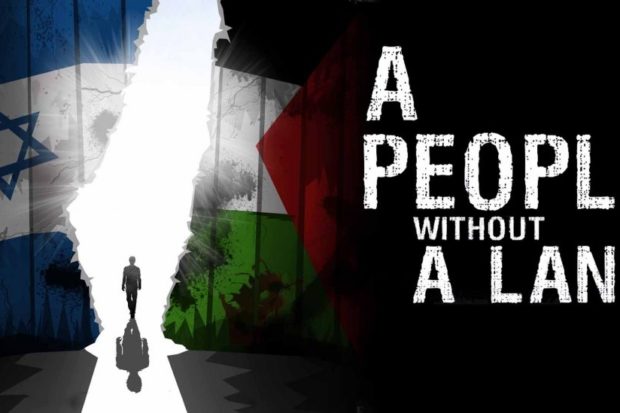
By Angela Price
As a Board member of the Fresno Center for Nonviolence, I routinely seek films that we might show, films that are “cutting edge,” often beautiful to look at and always provocative. This past summer, the film A People without a Land was highly recommended to me, and upon viewing it I suggested to the Board and they agreed that we should show it in October. Because of a recent decision to use venues other than our own facility, I was surprised that I was turned down several times, and among the reasons was that the film was too politically charged. In fact, I was so surprised that I looked at the film again! So we showed it at the Center on Oct. 19—with standing room only!
My thoughts recently have turned to why the film was considered “too political.” This documentary deals with the clear recognition that a two-state solution has been made impossible by Israeli actions with regard to settler building in the West Bank and the proposal that a one-state solution would be a much better way forward. Certainly, the one-state idea has been around for some time but it was the first I’d seen discussed on film and presented in a way that gave a feeling of hope as well. Difficult to achieve, yes. But not impossible.
If one looks back to the late 1800s, when Zionists started looking for a place to create a Jewish-only state, they eventually settled on Palestine even though, of course, this was not a “land without people” as about 96% of its inhabitants were non-Jewish (made up of Moslems and Christians) and about 4% Jewish. In 1948, following the end of World War II, the Zionists announced that their all-Jewish state was now created and would be called Israel. Of course, they were proud of its creation, especially after so many Jews—six million of them—had been slaughtered in the Holocaust. Never mind that more than 400,000 Palestinians had been forced to flee.
I think, then, as Jeff Halper of the ICAHD (Israeli Committee Against House Demolitions,) points out, that Israel is losing the moral war. The international BDS (Boycott, Divestment and Sanctions) movement is gathering steam with some recent important victories, and there is increasing criticism from countries in Europe as Israel continues to build in the West Bank. Since the beginning of this year, there have been many incidents of settler violence against Palestinian families, including the July horrific one of a Palestinian home being firebombed with the burning alive of an infant, and subsequent deaths from their burns of both father and mother.
The Israeli lobby in the United States is powerful; it is certainly successful in keeping all those running for electoral office from criticizing Israel and making proposals that the $10 million a day that we send to Israel (our tax dollars!) should be curtailed. Certainly, we are used to the major media blaming Palestine for the violence; even NPR holds Palestinians responsible for the recent outbreak of bloodshed.
Though difficult to accomplish, I believe that the Jewish-only state of Israel will eventually become one state and the Zionists’ dream of so many years ago will come to an end. That they fear this is evident as Israel seems intent on defying international laws with their unceasing building in the West Bank and continued violence in Gaza.
Another model for the area has been put forward by Halper: an even regional development made up of countries whose economies of Israel/Palestine, Jordan, Syria and Lebanon all make up the historical, natural and economic unit of that part of the world. It would mean that people could move around freely and yet have their citizenship rights protected to preserve their national identities. In other words, if Palestinian refugees want to return and live in the Galilee, they come home as Palestinian citizens. If an Israeli really wants to live in Hebron, he can live in Hebron as an Israeli citizen living in Palestine.
Finally, to move the conversation forward in the United States, we need to show films like A People without a Land, invite speakers like Alison Weir and Ronnie Barkan and attend events such as those during the Middle East Studies Program and Edward Said Lecture Series held at Fresno State recently. We need activists in progressive local organizations like the Palestine Freedom Project, Peace Fresno and the Women’s International League for Peace and Freedom. And we need to support, where we can, the international BDS movement.
*****
Angela Price is the development director for the Fresno Center for Nonviolence. Contact her at angela.price41@comcast.net.
